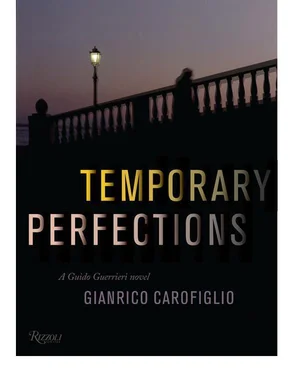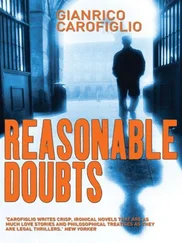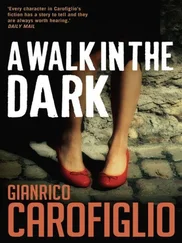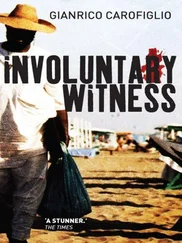Gianrico Carofiglio - Temporary Perfections
Здесь есть возможность читать онлайн «Gianrico Carofiglio - Temporary Perfections» весь текст электронной книги совершенно бесплатно (целиком полную версию без сокращений). В некоторых случаях можно слушать аудио, скачать через торрент в формате fb2 и присутствует краткое содержание. Жанр: Криминальный детектив, на английском языке. Описание произведения, (предисловие) а так же отзывы посетителей доступны на портале библиотеки ЛибКат.
- Название:Temporary Perfections
- Автор:
- Жанр:
- Год:неизвестен
- ISBN:нет данных
- Рейтинг книги:3 / 5. Голосов: 1
-
Избранное:Добавить в избранное
- Отзывы:
-
Ваша оценка:
- 60
- 1
- 2
- 3
- 4
- 5
Temporary Perfections: краткое содержание, описание и аннотация
Предлагаем к чтению аннотацию, описание, краткое содержание или предисловие (зависит от того, что написал сам автор книги «Temporary Perfections»). Если вы не нашли необходимую информацию о книге — напишите в комментариях, мы постараемся отыскать её.
Temporary Perfections — читать онлайн бесплатно полную книгу (весь текст) целиком
Ниже представлен текст книги, разбитый по страницам. Система сохранения места последней прочитанной страницы, позволяет с удобством читать онлайн бесплатно книгу «Temporary Perfections», без необходимости каждый раз заново искать на чём Вы остановились. Поставьте закладку, и сможете в любой момент перейти на страницу, на которой закончили чтение.
Интервал:
Закладка:
I was about to say that I’d take the money when I’d earned it. I was going to say it in a courteous yet firm tone of voice, one that would not allow him to answer. Then it struck me as a pretentious cliche. So I just told him to send me the documents as soon as possible. He said that I’d have a complete copy of the entire file that afternoon, and that was the end of our conversation.
To whatever extent possible, it’s best to avoid pretentious cliches, I thought.
That afternoon, someone from Fornelli’s law office came and handed Pasquale a sizable stack of files. Pasquale carried them into my office and reminded me that in about half an hour we had a meeting with the building commissioner from a small town in the surrounding province; our client had received a formal notification that he was under judicial investigation for malfeasance and illegal approval of subdivisions. For all I knew, the building commissioner was a perfectly law-abiding person, but in some small towns politics takes the form of anonymous accusations and complaints with the public prosecutor’s office.
I let the half hour slide by as I leafed through the file without really focusing on it. More than anything else, I felt it. Those photocopies had an aura that planted a deep and terrible sense of unease in me. I thought about the girl’s parents and about how I would have experienced something as horrifying as the death of a daughter. I tried to imagine it, but I couldn’t. It was so staggering that my imagination failed to provide me with a specific depiction of it. I could barely guess at the nature and scope of that horror.
Why would a normal young woman, with a normal life and a normal family, vanish from one moment to the next, without warning, without giving a sign, without leaving the slightest trace?
Was it possible that she had simply left of her own free will and was so heartless as to abandon her family to its anguish and despair? I decided that wasn’t possible.
If she hadn’t left of her own free will, two possibilities remained. Either someone had kidnapped her-but why?-or someone had killed her, intentionally or accidentally, and then arranged to conceal her body.
Those were some brilliant ideas, I thought. Signore and Signora Ferraro and my colleague Fornelli had certainly made the right decision when they hired a latter-day Auguste Dupin like myself.
The big question, though, was this: What could I do? Even if I read the file and managed to find a shortcoming in the investigation, what would the next step be? In spite of my conversation with Fornelli, I had absolutely no intention of hiring a private investigator. There must have been good investigators around, but I’d never been lucky enough to meet one. I had had only two experiences with detective agencies, and they had both been disasters. I’d sworn I’d never make that mistake again.
Moreover, the notion that I might start investigating the matter myself was crazy, crazy but dangerously enticing.
The only serious option, if I did manage to identify a plausible clue of any kind, was to request a meeting with the prosecutor and-very tactfully, because such people were quick to take offense-suggest that he investigate a little further before closing the case once and for all.
When the building commissioner arrived, I was in the throes of this sort of speculation. Luckily, I now had to think about him and his problems with the law, which distracted me from my tortured logic.
He seemed pretty upset. He was a high school teacher. This was the first time he’d held government office, and this was also his first brush with the law. He was afraid he might be arrested any minute.
I asked him to explain the situation in general terms. I took a quick look at the official notice he’d received and read through a few other documents he’d brought with him. In the end, I told him he could relax: As far as I could tell, there was really no serious evidence of wrongdoing on his part.
He seemed dubious, but relieved. He thanked me and we said our good-byes; I promised to meet with the prosecutor and inform him that my client was entirely willing to come in for an interview and felt sure he could clear up his role in the matter.
One by one, my colleagues-oh, how I dislike that word-came into my office to say good night before going home. This ceremony always makes me feel like a doddering old fool.
When I was finally alone, I called down to the Japanese take-out place a couple of blocks from my office and ordered a truly outsized meal of sushi, sashimi, temaki, uramaki, and a soybean salad. When the woman taking my order over the phone asked if I wanted something to drink, I hesitated for just a moment, then asked for a well-chilled bottle of white wine as well.
“Chopsticks and glasses for two, I imagine,” the young woman said.
“Of course, for two,” I answered.
8.
Forty-five minutes later, I was clearing a jumbled mess of plastic trays, little bottles, chopsticks, empty packets, and napkins off my desk. When I finished, I poured myself another glass of Gewurztraminer, stuck the plastic cork back into the bottle-I hate those plastic corks, but I have to admit that I haven’t had any corked wine since they were invented-and put it in the fridge. Every step performed slowly and very carefully. That’s how I always do things when I am preparing myself to begin a new task that makes me anxious. I do everything I can to delay the moment when I’ll have to begin, and I have to say, I’m pretty creative about it.
They call it a pathological tendency to procrastinate.
Apparently, this is a syndrome that is typical of insecure individuals who lack self-esteem; they continually put off disagreeable tasks in order to avoid being faced with their own shortcomings, fears, and limitations. I read something along those lines once, when I was leafing through a book called How to Stop Procrastinating and Start Living. It was a self-help book that explained the syndrome’s causes and then suggested about two hundred pages of crazy exercises to be used-I’m quoting verbatim-“to rid yourself of this disease of will and live a full, productive life, free of frustrations.”
I thought to myself that I wasn’t all that eager to have such a productive life, that self-help books that tell you how to change your life give me hives, and that a certain amount of frustration really didn’t bother me. So I put the book back on the shelf where I’d found it-as usual I was in a bookstore reading for free-and I bought an Alan Bennett book and went home.
After clearing away every trace of my Japanese dinner, after drinking a little more wine, after checking in vain for new e-mail, I realized the time had come.
I decided to read the file in the chronological order in which the authorities conducted their investigations, beginning with the event in question and moving forward from there. That’s not usually how I go through a file.
If I’m examining a file in which a warrant has been issued and my client is in jail, or under house arrest, the first thing I do is to read the court order for the warrant, which is the last document in the judicial proceedings. If I know the judge who wrote it, I immediately form an opinion about whether it’s a serious matter or not. After the judicial order, I read the other documents, working backward from last to first. I do the same thing if I’ve been hired after a trial verdict has been handed down, meaning first I read the court order that I’m being hired to appeal, and then I read everything else.
But in the case of the missing Manuela Ferraro, I thought it would be best to retrace the investigation as it developed, through the documents, doing my best to intuit whatever I could about the story behind those documents.
Читать дальшеИнтервал:
Закладка:
Похожие книги на «Temporary Perfections»
Представляем Вашему вниманию похожие книги на «Temporary Perfections» списком для выбора. Мы отобрали схожую по названию и смыслу литературу в надежде предоставить читателям больше вариантов отыскать новые, интересные, ещё непрочитанные произведения.
Обсуждение, отзывы о книге «Temporary Perfections» и просто собственные мнения читателей. Оставьте ваши комментарии, напишите, что Вы думаете о произведении, его смысле или главных героях. Укажите что конкретно понравилось, а что нет, и почему Вы так считаете.












